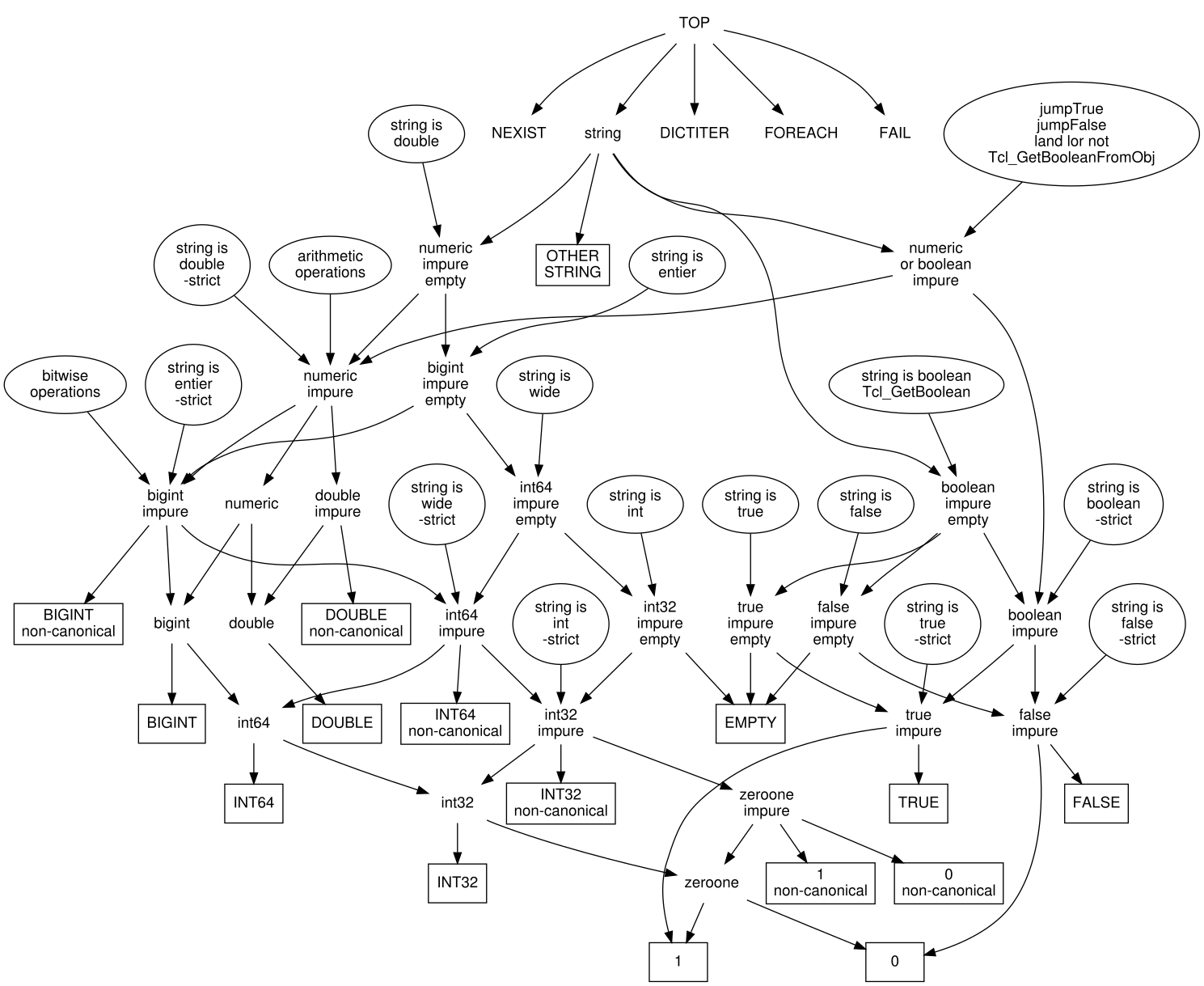Typed Tcl
MJ 2016-08-18: After watching Christian Gollwitzer and dkf's talks on EuroTcl I was contemplating an idea for Tcl9. A big reason of Tcl's flexibility is brought by EIAS, however this is a double edged sword.
- It's slow.
- It makes intellisense like tools virtually impossible.
So how about a Typed Tcl where you can define and use Tcl_Objs with a specific internal representation and conversion functions to other intreps without passing to string.
You would need to declare the value as a typed value and as soon as you play the EIAS card, you will get an error unless you make the shimmer explicit.
This has a couple of benefits.
- You wont break EIAS (it just needs to be explicit) so if you use a part of Tcl which is not type aware you need to pass toString $var instead of $var
- You can go fast if you have a direct intrep_type_a to intrep_type_b function defined.
This approach is complementary to the approach of speeding up Tcl by code analysis. Sometimes I will just know when I don't need EIAS but I will just need speed instead.
DKF: The current diagram of what types we've found in the tclquadcode work is:
Yes, it's a bit complicated. No, not everything is a string, but most things are (the things which aren't don't appear as values you can manipulate and so can be ignored).
How could it look?
settyped a list {a b c d}
puts $a; # error, can't use a tped Tcl_Obj as a string
puts [toString $a]; # ok $a is now untyped
dict get $a c; # error if there is no list->dict conversion
dict get [toString $a c]; # ok, EIASOn second thought, this will require a library user to cast every returned value to an untyped Tcl value to prevent errors, so this seems to be similar to Java land Object.
FM Now I think about something like a tag on the TCL_token. Ex :
set a {list}{a b c d}; # definition of the variable "a" as a list
puts {string}$a; # conversion of the "a" value as string, but var "a" remains a list
dict get {dict}$a; # conversion of the "a" value as dict, but var "a" remains a listHow to achieve this ? Maybe in the Tcl Parser, near where the expand {*} operator is checked ? The word could then be defined as a "TCL_TYPED_WORD"
This kind of "decoration" of tcl words could be used in a lot of places.
For instance :
- if inserted before proc names, it could specify the type of the proc return value,
- if before proc arguments, it could specify the type of the proc arguments.
proc {int}add {
{int}a; #first int value
{int}b; #second int value
} {
expr {$a+$b}
}There would be basic types : bool, int, float, number, string, binary, list, dict,...etc
We should also be able to define and compose new types. Ex :
define {dict}node {
{node}parent key -p default {}
{{node}list}children key -c default {}
{number}weight key -w default 0
}
set {node}Tree {}
# node type should inherit methods of dict (since it's a kind of dict)
node create Branch0 -p $Tree -w 1
node create Branch1 -p $Tree -w 0.4
node create Branch2 -p $Tree -w 0.5
# complementary Idea for "dict" : let's grant individual acces to properties with '«' '»'
# Well, the parser needs to be aware of unicode...
set Tree«children» [list $Branch0 $Branch1 $Branch2]
node set leave00 -p Branch0 -w 0.5
node set leave01 -p Branch0 -w 0.7
node set leave02 -p Branch0 -w 1.2
set Branch0«children» [list $leave00 $leave01 $leave02]
node set leave10 -p Branch1 -w 0.8
node set leave11 -p Branch1 -w 0.5
node set leave12 -p Branch1 -w 0.6
set Branch1«children» [list $leave10 $leave11 $leave12]
node set leave20 -p Branch2 -w 0.9
node set leave21 -p Branch2 -w 0.4
node set leave22 -p Branch2 -w 0.7
set Branch2«children» [list $leave20 $leave21 $leave22]
# Now, let's define a proc to Sum the weight along the Tree :
proc {number}totalWeight {
{node}tree
} {
set Sum $tree«weight»
foreach child in $tree«children» {
set Sum [expr {$Sum+[totalWeight $child]}]
}
return $Sum
}
# print out the result as a string
puts {string}[totalWeight $Tree]See Also
- Every Word is a Constructor
- More discussion of the same topic.
